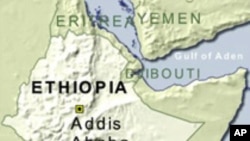<!-- IMAGE -->
Opposition groups in Ethiopia and the ruling party of Prime Minister Meles Zenawi have reportedly agreed to new rules for next year’s elections.
The new electoral laws reportedly outline campaigning, voting and party symbol guidelines and how to deal with intimidation and violence and call for the establishment of a panel to handle election disputes.
Berhanu Nega, a former leader of the Coalition for Unity and Democracy (CUD) and now a member of the Ginbot 7 said Ethiopia is not a conducive country for democracy.
“All the issues that make a democratic election do not exist in Ethiopia at this time, starting from the independence of the election board, the independence of the military and the police, judiciary all are in the pocket of the ruling class. And in the absence of a fair and leveled playing ground there is no meaning in an election,” he said.
Nega said the 2010 election will most likely be similar to the 2008 local election when he said Prime Minister Meles Zenawi’s ruling party won 99 point nine percent of the vote.
He said two of the opposition parties that reportedly agreed on the new rules for next year’s election were created by the government.
“You know there are three parties who participated in this. Two of them are the parties created by the ruling party. So these are not serious parties. This is just simply to show to the gullible international community that there is some election taking place. But nobody in Ethiopia is taking it seriously at all,” he said.
Nega said his party would not take part in what he described as a sham election in 2010 election.
“I think by now Africans are aware what actually is going on in the name of elections. Elections are supposed to be mechanisms through which popular will would be reflected. But in our continent in most countries, especially in Ethiopia, it has become an exercise in futility,” he said.
Nega
was elected mayor of Addis Ababa in the 2005 election, but he and other
opposition leaders were later jail after the government charged them with
genocide and treason.
He said since 2005 Ethiopia has turned into a totalitarian state and that the only option for most Ethiopians is to remove the government.
“Even by African standards, this is a suffocating dictatorship that has completely the life out of Ethiopian politics and for most Ethiopians now the only way out of this political quagmire is to get rid of this government by one means or another,” he said.
Nega concord his comments would be interpreted as seeking the overthrow of the Meles Zenawi government.
“I am very, very clear and ardent than this. Unless otherwise people are free they cannot solve their basic economic problems...we have a very unpopular government, despotic government. Unless otherwise people start to take responsibility for their lives, I don’t think you’re going to make significant change in the economic wellbeing of the people,” Nega said.
He said the recent famine in Ethiopia is the result of the Meles Zenawi government being much more interested in staying in power rather than developing the country and saving the people.
<!-- IMAGE -->




